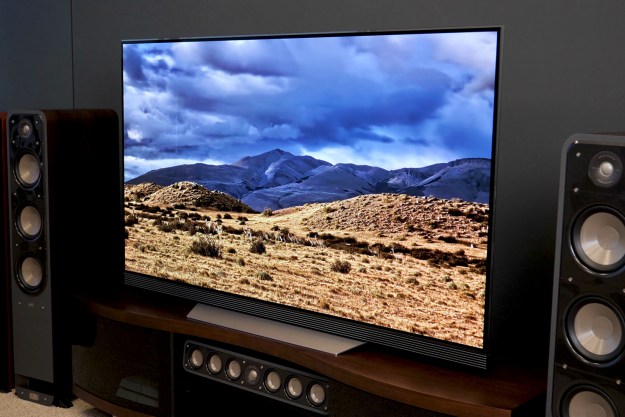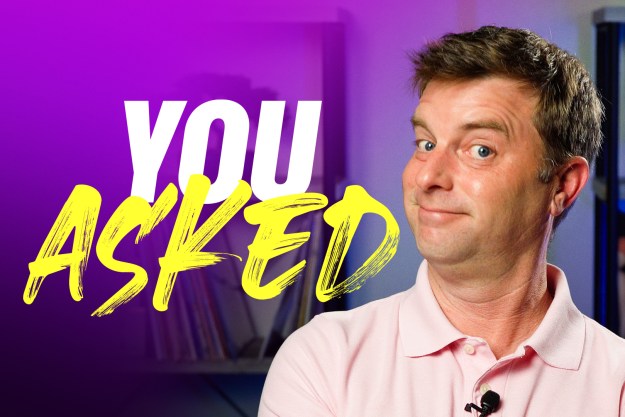
“LG’s E7 OLED is one of the finest TVs money can buy, and is the best choice for those who like the finer things in life.”
- Gorgeous design
- Excellent user interface
- Great out-of-box picture performance
- Wide viewing angle
- Solid sound quality
- LG C7 performs just as well for far less
- Soundbar can’t be removed or tucked away
With each passing OLED TV review we conduct, the task becomes easier in some respects and more difficult in others. Since OLED televisions have only moved forward – no new model has ever been any worse than the one before it – it’s easy enough to focus on improvements made and the impact they have on the overall experience of ownership. On the other hand, trying not to sound like a broken record when raving about OLED picture quality is an increasing challenge. Fortunately for us though, this LG E7 OLED review – and the forthcoming LG C7 OLED review to follow – are made both easy and unique thanks to an opportunity we had this year to perform side-by-side evaluations of 22 different television models from four major manufacturers, including LG, Samsung, Sony, and TCL, all at once.
With that many TVs on hand, we were able not only to evaluate the flagship sets from those major brands, but also to compare them to mid-tier and entry-level models across brands. The result was an impressively comprehensive overview of the state of TV tech in 2017, and the results are in: The LG E7 is one of the five best TVs you can buy right now. Is it number one? No. Why? We’ll get to that. First we’ll explain what makes the LG E7 OLED so desirable, and why it may be the number one TV pick on your list, even if it isn’t on ours.
Out of the box
We’ve unboxed and set up 10 OLED TVs so far, and the experience never wears thin. When you crack open the box and see the LG E7 OLED TV for the first time, you’ll feel like it’s your birthday. As our unboxing and setup video below shows, everything about the process, from attaching the included table stand to choosing and tweaking picture setting presets, is as easy as it gets these days. That said, we highly recommend having a friend over to help you out. Just because this is an impossibly thin and light TV doesn’t mean you should go it alone. Be safe!
Once the TV is good to go, you’ll want to get straight to watching – we don’t blame you — but at some point take a moment to appreciate just how beautifully LG’s “Picture on Glass” design is implemented here. The TV’s panel appears to float thanks to virtually invisible edges, and the TV’s integrated soundbar blends seamlessly with its stand. It’s a gorgeous TV that is sure to dress up any room – and that’s one of its biggest selling points over less expensive models in LG’s OLED TV lineup.
Features and Improvements
While visiting LG in San Francisco for a W7 “Wallpaper” OLED TV review, we got a chance to take a look at last year’s LG E6 OLED side-by-side with an LG E7 OLED as the company broke down the essential differences between the two. The 2-hour long deep dive can best be summed up this way: The E7 offers better detail in dark areas of the screen, is noticeably brighter than the year before (testing resulted in varied percentages of improvement), and has a better anti-reflective coating which allows the screen to look black instead of purple when turned off. In addition, off-angle color is better, while on-angle color has less of a green tint to the gray scale than we’ve seen in models of the past. Taken together, these minor improvements result in a significantly better OLED TV line for LG.
The E7 OLED’s picture just pulls you in and begs you to stare at it all day. And so we did.
The E7, along with all of LG’s OLED TVs, supports both HDR10 and Dolby Vision flavors of HDR out of the box, with the ability to support Hybrid Log Gamma (HLG) and Technicolor’s forthcoming HDR variant via firmware update in the future. At CEDIA 2017, we also learned from Tim Alessi, LG’s VP of Product Marketing, that the E7 OLED will also be outfitted with Technicolor picture presets — created by the same wizards who color and master the lion’s share of Hollywood’s hottest films — via future update.
WebOS remains one of our favorite smart TV interfaces – it smokes the Android TV platform as implemented in Sony’s televisions, stands right up there against Samsung’s Tizen interface, and, more generally speaking, its implementation within 2017 OLEDs is extremely important. To enjoy streaming 4K HDR content, one must be able to find it, and the TV must be able to communicate with streaming services in order to determine whether Dolby Vision or HDR10 software should be launched. Through WebOS, LG’s TVs offer excellent cross-platform search, and make finding 4K HDR content straightforward. (It should be noted that Dolby Vision will be the preferred flavor of HDR when available.)
What’s more, LG’s TVs are the best on the market when it comes to clear communication about when HDR content is being received and displayed. Any time an HDR content signal is received, be it from a streaming service like Netflix or Amazon, or an Ultra HD Blu-ray disc, LG’s HDR-capable televisions will toss a prominent graphic up in the top right-hand corner of the screen. It seems like a little thing, but it goes a long way toward ensuring you are getting the very best picture quality available.
To control WebOS, and indeed the rest of the television, LG provides its Magic Motion remote, this year with a few hot keys to popular streaming services as well as a scrolling wheel, handy for quickly moving through those multiple rows of content on services like Netflix and Hulu. The Magic Motion remote’s option of point-and-click style control also comes in handy for entering usernames and passwords through on-screen keyboards more quickly.
A final note, this one for gamers: LG says it worked hard to reduce input lag so its OLEDs would be taken more seriously by hardcore gamers. With a measured input lag of 21.1, I’d say they have earned it.
Performance
For this LG E7 OLED review, we set up the LG C7, Sony A1E OLED, and Samsung Q9 QLED TV side-by-side and fed them all with the same content sources, including streaming content from Netflix and Amazon in HDR10 and Dolby Vision (when available), Ultra HD Blu-rays, and proprietary demo reels from both LG and Sony served up using USB thumb drives.
The LG E7 offers the best overall picture quality and user experience available today, but then again, so does the LG C7 OLED at roughly $1,000 less in each size. Let us be clear here: The C7 offers the same picture quality and overall user experience as the more expensive E7. Why, then, would one want to pay more for the LG E7 OLED? LG believes it comes down to the TV’s picture-on-glass design and integrated sound bar with forward-facing speakers.
Beauty is in the eye of the beholder, but we think the LG E7 – especially the larger 65-inch version – offers the best balance between form and function in the lineup. It simply looks better than LG’s other models (the out-of-this-world W7 Wallpaper OLED notwithstanding – that thing is just in a class all its own), and we think that’s worth a lot to someone spending big bucks on an ultra-premium TV.
We’re not as bullish on the advantages of the LG E7 OLED’s integrated soundbar, however. While we do appreciate the much-improved sound quality and clarity afforded by forward-firing speakers – dialogue is significantly more intelligible on this TV and stereo effects are more discernible than on the C7 and B7 – our belief is that most folks shopping for an upscale OLED TV are likely planning to bring in a sound solution of their own choosing, be it an independent soundbar or full-on home theater system. That being the case, it’s hard to lend much weight to this half of the upgrade proposition. For most folks, the C7 is simply a smarter choice.
With that said, the E7 is the smartest choice among upscale OLED TVs. In a battle we conducted between the Sony A1E OLED and the LG E7 OLED, we had a tough time calling a definitive winner based on picture quality alone, but the E7 ended up winning because LG’s WebOS integration far outperformed Sony’s Android TV integration, even though the Sony has some slick features the LG doesn’t offer, such as Google Cast compatibility and Amazon Alexa voice control options.
Against the Samsung Q9 QLED, the LG E7 OLED was more enjoyable to all who viewed the two together, even though the Samsung Q9 bests the E7 OLED in peak brightness, which one would think would be a trump card for HDR. With perfect black levels and more-than-ample brightness for daytime viewing, however, the E7 OLED offers more dimension with HDR programming – its picture just pulls you in and begs you to stare at it all day.
So, we did. We spent 8 hours watching several movies in a somewhat gluttonous marathon of TV watching, and walked away wanting to watch more. If that’s not a glowing endorsement for a TV, we don’t know what is.
Out-of-box color is excellent when the ISF Bright Room or ISF Dark room preset is selected, though a professional calibrator can get the TV to display an image slightly closer to cinema standards if you let them have a whack at it. For most folks, though, the built-in presets will more than suffice.
The LG E7 OLED may not be the best choice for everyone, but if breathtaking design and superior on-board sound are of significant importance, then the LG E7 OLED is the TV you and your living room deserve.
Warranty information
LG offers one year warranties for both parts and labor for its OLED TVs.
Our Take
The LG E7 OLED offers the best picture quality and user experience money can buy, but unless you need the slick picture on glass design and premium audio, the less expensive LG C7 OLED makes more sense.
Is there a better alternative?
Yes. To no one’s surprise, the LG C7 is our preferred alternative for most buyers as it offers all of the most meaningful benefits of an LG OLED without quite as sharp a sticker price. The Sony A1E OLED is also a close competitor when it comes to sound quality and design, but it comes in a significantly different style and isn’t as thin or sleek as the LG E7. Against the Samsung Q9, the LG E7 offers fewer amenities – the Q9 has a flush mounting system and fiber-optic signal delivery system which is undeniably cool, plus its superior peak brightness battles back intense sunlight a bit better – but the E7’s picture quality is notably superior from our viewpoint.
How long will it last?
This is the most future-proof LG OLED yet, with support for all currently available HDR formats, and several planned for the future. In terms of build quality, this is the most solid-feeling OLED we’ve tested to date, and built-in features to help avoid any kind of image retention should mean the screen will last longer than most folks keep their TVs today.
Should you buy it?
Do buy the LG E7 if you like fancy design along with slightly better sound quality built in, and don’t mind paying a lot more for a little extra. Don’t buy it if you like saving money and maximizing value – go get LG’s C7 OLED instead.










